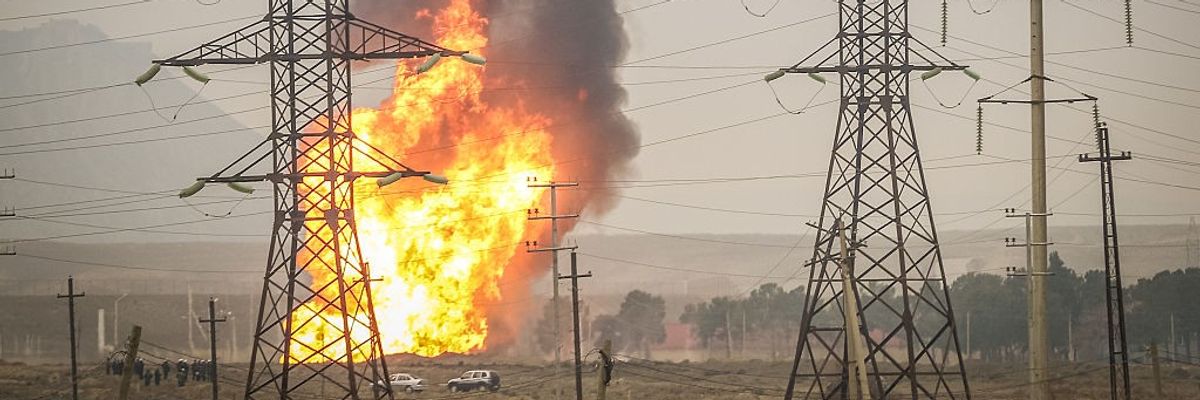
A gas pipeline explodes by a highway in Azerbaijan in 2016. The country is rich in oil and gas resources.
Azerbaijan's New Climate Fund, Easy on Fossil Fuel Producers, Denounced as 'Smoke Screen'
The country's new climate finance fund—an initiative watered down by fossil fuel producers—draws criticism as the oil-producing country prepares to host the U.N. climate summit in November.
Climate campaigners on Thursday dismissed Azerbaijan's plan for a $500 million climate investment fund, arguing that it was a small, poorly designed initiative meant to distract from the nation's oil production.
The criticism came following news that Azerbaijan, which is seeking to bolster its green credentials as it prepares to host the United Nations Climate Change Conference (COP29) in November, plans to raise at least $500 million of financing for clean energy investments in the Global South. The money would come from fossil fuel producers, including the state-owned Azerbaijani company SOCAR.
Azerbaijani officials considered introducing a levy on fossil fuel producers to raise money for the fund but, after facing opposition from oil-producing Gulf countries, opted for a voluntary, public-private investment model, an anonymous source told Reuters.
350.org called Azerbaijan's plan a "commercial" venture and said "we must distinguish profit-driven investments from genuine efforts," in a statement.
"The role of a COP presidency is to drive forward highly concessional climate finance, not profit from it," said Andreas Sieber, associate director of policy and campaigns. "We demand accountability through tax levies, not token charity, in this climate emergency. Those responsible for the climate crisis must pay for what they have created."
🧵1/4
BREAKING: @COP29_AZ plans a $500mn fund with the money of #fossilfuel industry to fund the energy transition - sounds good at first, but its a charade to distract us from the #fossil industrys deadly unwillingness to transition. Lets unpack:https://t.co/R1A6gP0x1S
— Andreas Sieber (@ClimateAndreas) July 11, 2024
Azerbaijan's new fund marks the second year in a row that an oil-producing nation has sought to deflect criticism by announcing a climate finance venture ahead of the U.N. summit.
The United Arab Emirates (UAE), which hosted COP28 last year, announced a far larger climate investment fund, with a $30 billion initial investment and a goal of raising $250 billion. Forbes reported after COP28 that "the reality is the fund is an investment tool with a primary purpose of profits for the investors."
Like the UAE last year, Azerbaijan faces questions as its commitment to climate action.
"Several diplomats and negotiators have privately expressed concerns that Azerbaijan, which relies heavily on oil and gas revenues, is fundamentally reluctant to address the question of how to shift away from fossil fuels," The Financial Times reported.
In January, Azerbaijan appointed a 20-year oil and gas veteran to lead COP29 talks, drawing criticism from environmental groups. A Global Witness report revealed that the country plans not to phase out fossil fuel use, per an international agreement made at COP28, but to raise gas production by one-third in the next decade.
An Urgent Message From Our Co-Founder
Dear Common Dreams reader, The U.S. is on a fast track to authoritarianism like nothing I've ever seen. Meanwhile, corporate news outlets are utterly capitulating to Trump, twisting their coverage to avoid drawing his ire while lining up to stuff cash in his pockets. That's why I believe that Common Dreams is doing the best and most consequential reporting that we've ever done. Our small but mighty team is a progressive reporting powerhouse, covering the news every day that the corporate media never will. Our mission has always been simple: To inform. To inspire. And to ignite change for the common good. Now here's the key piece that I want all our readers to understand: None of this would be possible without your financial support. That's not just some fundraising cliche. It's the absolute and literal truth. We don't accept corporate advertising and never will. We don't have a paywall because we don't think people should be blocked from critical news based on their ability to pay. Everything we do is funded by the donations of readers like you. Will you donate now to help power the nonprofit, independent reporting of Common Dreams? Thank you for being a vital member of our community. Together, we can keep independent journalism alive when it’s needed most. - Craig Brown, Co-founder |
Climate campaigners on Thursday dismissed Azerbaijan's plan for a $500 million climate investment fund, arguing that it was a small, poorly designed initiative meant to distract from the nation's oil production.
The criticism came following news that Azerbaijan, which is seeking to bolster its green credentials as it prepares to host the United Nations Climate Change Conference (COP29) in November, plans to raise at least $500 million of financing for clean energy investments in the Global South. The money would come from fossil fuel producers, including the state-owned Azerbaijani company SOCAR.
Azerbaijani officials considered introducing a levy on fossil fuel producers to raise money for the fund but, after facing opposition from oil-producing Gulf countries, opted for a voluntary, public-private investment model, an anonymous source told Reuters.
350.org called Azerbaijan's plan a "commercial" venture and said "we must distinguish profit-driven investments from genuine efforts," in a statement.
"The role of a COP presidency is to drive forward highly concessional climate finance, not profit from it," said Andreas Sieber, associate director of policy and campaigns. "We demand accountability through tax levies, not token charity, in this climate emergency. Those responsible for the climate crisis must pay for what they have created."
🧵1/4
BREAKING: @COP29_AZ plans a $500mn fund with the money of #fossilfuel industry to fund the energy transition - sounds good at first, but its a charade to distract us from the #fossil industrys deadly unwillingness to transition. Lets unpack:https://t.co/R1A6gP0x1S
— Andreas Sieber (@ClimateAndreas) July 11, 2024
Azerbaijan's new fund marks the second year in a row that an oil-producing nation has sought to deflect criticism by announcing a climate finance venture ahead of the U.N. summit.
The United Arab Emirates (UAE), which hosted COP28 last year, announced a far larger climate investment fund, with a $30 billion initial investment and a goal of raising $250 billion. Forbes reported after COP28 that "the reality is the fund is an investment tool with a primary purpose of profits for the investors."
Like the UAE last year, Azerbaijan faces questions as its commitment to climate action.
"Several diplomats and negotiators have privately expressed concerns that Azerbaijan, which relies heavily on oil and gas revenues, is fundamentally reluctant to address the question of how to shift away from fossil fuels," The Financial Times reported.
In January, Azerbaijan appointed a 20-year oil and gas veteran to lead COP29 talks, drawing criticism from environmental groups. A Global Witness report revealed that the country plans not to phase out fossil fuel use, per an international agreement made at COP28, but to raise gas production by one-third in the next decade.
- 'Outrageous': Azerbaijan Picks Former Oil Exec to Head COP29 ›
- In 'Sick Joke', COP29 Host Azerbaijan to Raise Gas Production by a Third ›
- Opinion | Stand Up for Human Rights in Azerbaijan, at COP29 and Beyond | Common Dreams ›
- COP29 Host's State Oil Company 'Aggressively' Ramping Up Fossil Fuel Production: Report | Common Dreams ›
Climate campaigners on Thursday dismissed Azerbaijan's plan for a $500 million climate investment fund, arguing that it was a small, poorly designed initiative meant to distract from the nation's oil production.
The criticism came following news that Azerbaijan, which is seeking to bolster its green credentials as it prepares to host the United Nations Climate Change Conference (COP29) in November, plans to raise at least $500 million of financing for clean energy investments in the Global South. The money would come from fossil fuel producers, including the state-owned Azerbaijani company SOCAR.
Azerbaijani officials considered introducing a levy on fossil fuel producers to raise money for the fund but, after facing opposition from oil-producing Gulf countries, opted for a voluntary, public-private investment model, an anonymous source told Reuters.
350.org called Azerbaijan's plan a "commercial" venture and said "we must distinguish profit-driven investments from genuine efforts," in a statement.
"The role of a COP presidency is to drive forward highly concessional climate finance, not profit from it," said Andreas Sieber, associate director of policy and campaigns. "We demand accountability through tax levies, not token charity, in this climate emergency. Those responsible for the climate crisis must pay for what they have created."
🧵1/4
BREAKING: @COP29_AZ plans a $500mn fund with the money of #fossilfuel industry to fund the energy transition - sounds good at first, but its a charade to distract us from the #fossil industrys deadly unwillingness to transition. Lets unpack:https://t.co/R1A6gP0x1S
— Andreas Sieber (@ClimateAndreas) July 11, 2024
Azerbaijan's new fund marks the second year in a row that an oil-producing nation has sought to deflect criticism by announcing a climate finance venture ahead of the U.N. summit.
The United Arab Emirates (UAE), which hosted COP28 last year, announced a far larger climate investment fund, with a $30 billion initial investment and a goal of raising $250 billion. Forbes reported after COP28 that "the reality is the fund is an investment tool with a primary purpose of profits for the investors."
Like the UAE last year, Azerbaijan faces questions as its commitment to climate action.
"Several diplomats and negotiators have privately expressed concerns that Azerbaijan, which relies heavily on oil and gas revenues, is fundamentally reluctant to address the question of how to shift away from fossil fuels," The Financial Times reported.
In January, Azerbaijan appointed a 20-year oil and gas veteran to lead COP29 talks, drawing criticism from environmental groups. A Global Witness report revealed that the country plans not to phase out fossil fuel use, per an international agreement made at COP28, but to raise gas production by one-third in the next decade.
- 'Outrageous': Azerbaijan Picks Former Oil Exec to Head COP29 ›
- In 'Sick Joke', COP29 Host Azerbaijan to Raise Gas Production by a Third ›
- Opinion | Stand Up for Human Rights in Azerbaijan, at COP29 and Beyond | Common Dreams ›
- COP29 Host's State Oil Company 'Aggressively' Ramping Up Fossil Fuel Production: Report | Common Dreams ›

